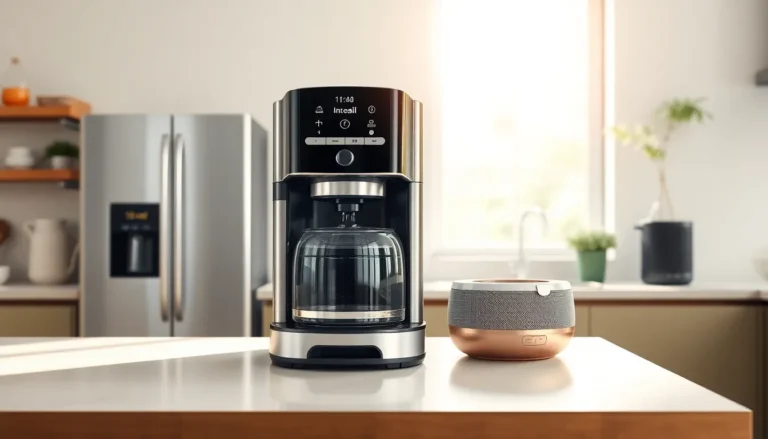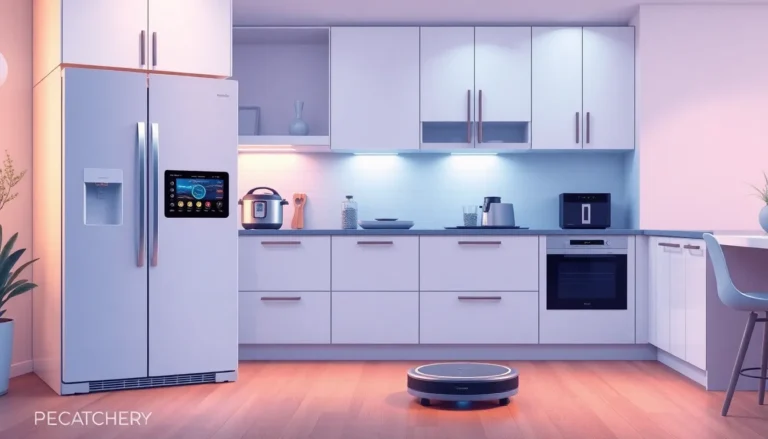Table of Contents
ToggleImagine opening your fridge and getting a friendly reminder that the milk’s about to expire or that you’re out of your favorite snacks. Smart refrigerators are revolutionizing the way people think about food storage and kitchen management. These tech-savvy appliances don’t just keep things cold; they bring a little intelligence into your culinary life.
With features like touch screens, built-in cameras, and even voice assistants, smart fridges are the modern-day equivalent of a kitchen buddy who always knows what’s up. They help streamline grocery shopping, reduce food waste, and even suggest recipes based on what’s inside. So if you’re still clinging to that old clunker from the ’90s, it might be time to embrace the future and let your fridge do the heavy lifting. Who knew keeping your food fresh could be this fun?
Overview of Smart Refrigerators
Smart refrigerators represent a significant advancement in kitchen technology. These devices integrate connectivity features, allowing users to manage food items seamlessly. Many models include touch screens, offering easy access to various functions like calendars and recipes. Built-in cameras enable users to check their inventory remotely via smartphone apps.
Voice assistants come standard in many smart refrigerators, letting users navigate through various tasks hands-free. Such innovations help streamline grocery shopping by tracking food supplies and sending alerts when items run low.
Features like recipe suggestions based on existing ingredients minimize food waste and enhance meal preparation. Users can easily share grocery lists with family members, making it simpler to organize shopping trips.
Smart refrigerators can connect to other smart home devices, creating a cohesive ecosystem that simplifies daily tasks. Energy efficiency stands out as another critical advantage, with many models featuring settings that optimize power consumption.
Incorporating these advanced appliances into any kitchen can transform mealtime and improve overall efficiency. The investment in a smart refrigerator often pays off through its functionality and convenience, offering a modern solution for food storage and kitchen management.
Benefits of Smart Refrigerators
Smart refrigerators provide numerous advantages that enhance kitchen efficiency and food management.
Energy Efficiency
Energy efficiency stands out as a significant benefit of smart refrigerators. Many models use advanced technology to regulate power consumption, leading to lower utility bills. Energy Star-rated options consume about 15% less energy than standard models. Smart features optimize cooling based on usage patterns, ensuring energy isn’t wasted. Some appliances even provide real-time energy usage data, helping users track consumption. Investing in these energy-efficient appliances not only benefits the environment but also contributes to long-term savings.
Food Management
Food management improves significantly with smart refrigerators. Built-in cameras allow users to monitor inventory from anywhere, reducing unnecessary purchases. They send alerts for low stock items, ensuring essential supplies are always available. Smart refrigerators can suggest recipes based on available ingredients, minimizing food waste. Sharing grocery lists with family members promotes collaborative planning, enhancing overall meal preparation. Voice assistant integration provides hands-free access to recipes and food management tasks, streamlining kitchen activities for everyone.
Features of Smart Refrigerators
Smart refrigerators come equipped with several innovative features enhancing their functionality and user experience. These features transform kitchen management, making it easier for households to streamline food storage and meal preparation.
Connectivity and Smart Home Integration
Connectivity plays a crucial role in smart refrigerators. Many models integrate with existing smart home systems, allowing seamless communication with other devices. Users enjoy features like remote monitoring via smartphone apps. Accessing grocery lists and sending alerts about low-stock items becomes straightforward. Voice assistants simplify navigation through functions, enabling hands-free operation while preparing meals. Families can share lists and plan meals collaboratively. These fridges often connect to smart speakers, lighting, and security systems, creating a cohesive ecosystem that elevates kitchen efficiency.
Advanced Cooling Technologies
Advanced cooling technologies set smart refrigerators apart. Many utilize sensors to optimize temperature and humidity levels based on internal conditions. They often adjust power consumption according to user habits, maintaining freshness while conserving energy. Energy Star-rated models can consume about 15% less energy than standard refrigerators. Some units feature advanced cooling compartments for fruits and vegetables, preserving nutrition for longer periods. Smart refrigerators frequently provide real-time temperature data, alerting users to any fluctuations. These innovations enhance food preservation while minimizing waste, making smart refrigerators an essential upgrade for modern kitchens.
Popular Brands and Models
Various brands lead the smart refrigerator market, each offering unique features that cater to diverse needs. Samsung’s Family Hub series includes large touch screens, internal cameras, and smart assistant capabilities, enhancing kitchen management. LG’s InstaView models allow users to knock twice on the glass panel to see inside without opening the door, promoting energy efficiency.
Whirlpool stands out with its smart kitchen line, focusing on practicality and ease of use, featuring intuitive controls and compatibility with smart home systems. Bosch boasts sleek designs with integrated home connectivity, making it an ideal option for modern households.
Miele is known for high-end models that combine luxury with advanced technology, offering customizable settings for optimal food preservation. Frigidaire’s Gallery series provides affordability while incorporating many smart features, such as remote inventory tracking and recipe suggestions.
A table summarizing key features across popular brands can provide additional insights:
| Brand | Key Model | Notable Features |
|---|---|---|
| Samsung | Family Hub | Touch screen, built-in cameras, voice assistant |
| LG | InstaView | Knock-to-view feature, smart tracking |
| Whirlpool | Smart Kitchen Line | Intuitive controls, smart home compatibility |
| Bosch | Series 800 | Sleek design, integrated connectivity |
| Miele | 4000 Series | Custom settings, high-end luxury |
| Frigidaire | Gallery Series | Affordability, remote tracking |
Understanding these brands and models empowers consumers to choose the best smart refrigerator for their kitchen. Advanced features, efficient design, and connectivity options simplify food management while enhancing culinary experiences.
Smart refrigerators are revolutionizing kitchen management and food storage. With their advanced features and connectivity options they not only enhance convenience but also promote energy efficiency and reduce food waste. The integration of touch screens voice assistants and built-in cameras makes meal planning and inventory management a breeze.
As technology continues to advance these appliances will only become more essential in modern homes. Upgrading to a smart refrigerator can lead to a more organized kitchen and a sustainable lifestyle. With various brands offering unique features there’s a perfect model for everyone looking to elevate their culinary experience. Embracing this innovation means stepping into a future where managing food is simpler and more efficient.







